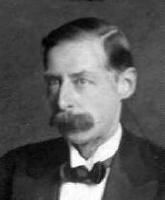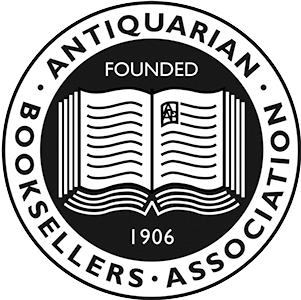Percy Dobell

Percy John Dobell (1871-1956) served as president of the International Association of Antiquarian Booksellers (as the ABA was then called) in 1922. Born at Kentish Town in North London in the latter part of 1871, he was the second son of the well-known bookseller, poet and man of letters, Bertram Dobell (1842-1914), and his wife Eleanor Wymer (1847-1910), who had married in 1869.
On the death of his father, the business passed to Percy Dobell and his younger brother, Arthur Eustace Dobell (1882-1956). Both had long worked for their father: Percy Dobell had been a familiar figure in the auction rooms in his own right since the Ashburnham sale in 1897. The firm simply carried on as “P. J. & A. E. Dobell”, continuing for very many years to add “Sons of the late Bertram Dobell” to their letterhead. Percy was evidently always the senior figure and looked after the shop at 54 Charing Cross Road, mainly specialising in 17th and 18th-century English literature. Arthur looked after the other Dobell shop at 77 Charing Cross Road, with a stock of modern first editions and all the other “miscellaneous”.
Percy was immediately recruited to the ABA Committee in place of his father, who had served on it since the ABA was founded in 1906. He was to serve on the Committee for over thirty years. Already in his forties, Percy Dobell was also now a family man. A painfully short first marriage to Emma Curtis Browne in 1903 had ended with her early and untimely death in 1905. In 1909 he married Helen Jane Wright (1886-1961), the privately educated daughter of a Norfolk farmer. A daughter, Margaret Eleanor Dobell (1910-1985), and a son, Robert John Dobell (1913-1972), soon followed. The family lived initially at 13 Torrington Park, North Finchley, subsequently at 1 Branch Hill Side, Hampstead, and then (from 1921) at The Hermitage, Windsor Terrace, Belsize Park. Their final London home was a 2 Ornan Mansions, Haverstock Hill.
Business continued. The Western Daily Press of Saturday 10th June 1916 reported the sale of a “remarkable collection of English historical broadsides and proclamations printed between 1626 and 1700” – some 800 items in all – while in April 1918 the Aberdeen Journal, after bemoaning the wartime paper shortages that were interfering with the production of booksellers’ catalogues, noted that “A new catalogue is being eagerly awaited from Mr Percy Dobell, the son of the late Bertram Dobell, to whom innumerable book-lovers were debtors, who has nearly ready a catalogue of ‘The Literature of the Restoration’, embracing poetical and dramatic works produced between 1660 and 1700, with particular reference to the writings of Dryden. Mr Dobell has given considerable space to the work of, among others, Mrs Behn, Congreve, Lee, Otway, Villiers Duke of Buckingham, and Wilmot Earl of Rochester, but it is his presentment of the minor writers, practically unknown even to diligent students of our poetical literature, that constitutes the value of the forthcoming catalogue”.
This was followed by “Books of the Time of the Restoration” (1920) and that particular field was becoming Percy Dobell’s own. His publication of “John Dryden : Bibliographical Memoranda” (1922) fully established his authority, an authority which extended to the eighteenth century as well, with, for instance, the magisterial “A Catalogue of XVIIIth Century Verse and a Catalogue of Books by and Relating to Dr. Jonathan Swift” (1933).
The premises at 54 Charing Cross Road were left behind for larger ones at 8 Bruton Street in 1921. As Dobell’s son reminisced in a letter to John Sparrow, “There was no inner sanctum and my father was always easily approached but, as you may agree, the whole shop was a ‘sanctum’ in the sense that it was filled with the atmosphere arising from the taste, knowledge and personal qualities of the owner”.
The family opened a third shop in 1923. The brothers’ sister Evelyn Jane Dobell (1874-1953) had married Carlo Rota in 1901. Their son Cyril Bertram Rota (1903-1966 – father of future president Anthony Rota, grandfather of future president Julian Rota), having learnt his trade under his uncles since 1918, was ready to set up on his own – and brought into being one of the most famous of all dynasties dealing in modern first editions.
In 1934, Percy Dobell removed his portion of the business to Tunbridge Wells. A reporter for the Kent & Sussex Courier (Friday 28 July 1939), apparently picking up on something which had earlier appeared in the Evening Standard, paints a picture of him there: “l learn that Mr. Percy J. Dobell of 24, Mount Ephraim, Tunbridge Wells, the 17th century book expert, has sold his private collection of works and relating to John Dryden, the finest this country, to an American university ... It is not often that booksellers have either the time or the means to form private collections. Mr. Dobell is the rare exception ... Mr. Dobell was for many years in business in Bruton Street, a timid, bent, grizzled figure, concealed behind an untidy pile of rare books and pamphlets in a dark, back room. He moved a few years ago to the relative seclusion of Tunbridge Wells, where he is training his son to succeed him the business”.
The “P. J. and A. E. Dobell” partnership was formally brought to an end on 31st December 1945, the Tunbridge Wells part of the enterprise becoming “Percy J. Dobell & Son”, with Robert Dobell becoming a full partner in 1949. After his father’s death on 23rd January 1956, his son issued a short tribute, “Percy J. Dobell : Enlightened Bookseller”. It made the interesting point that Dobell believed that the relationship between collectors, librarians and booksellers had become much more amicable over the course of his career: “I believe that he was himself responsible for that improved feeling as much as anyone”. Robert Dobell also remembered his delight at watching the courtesy and consideration which his father treated the humblest purchaser or the youngest collector, even while busy on something rather more interesting: “I took this to be the proof of a great bookman”.
